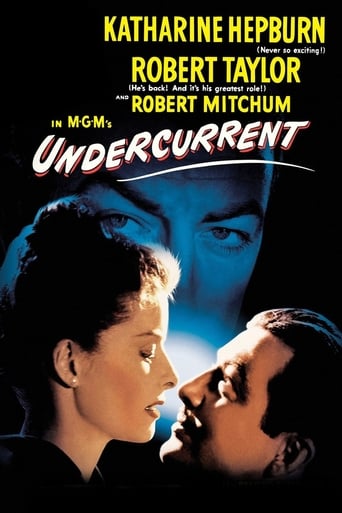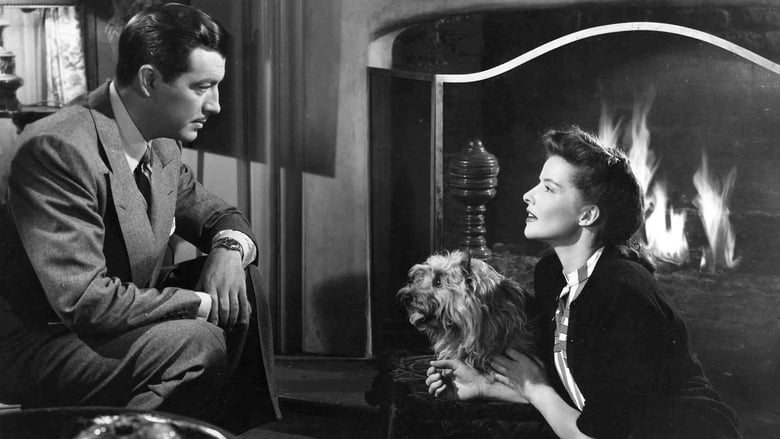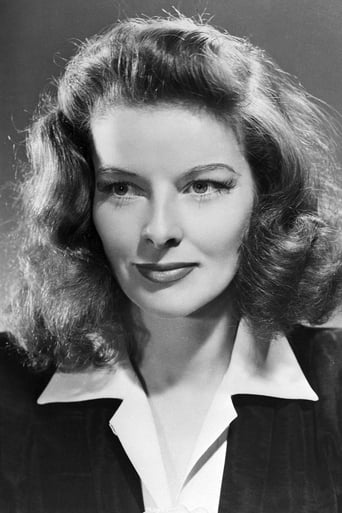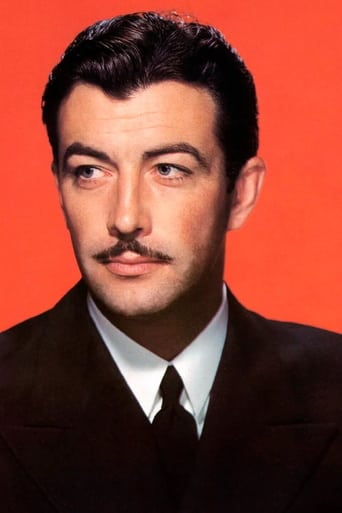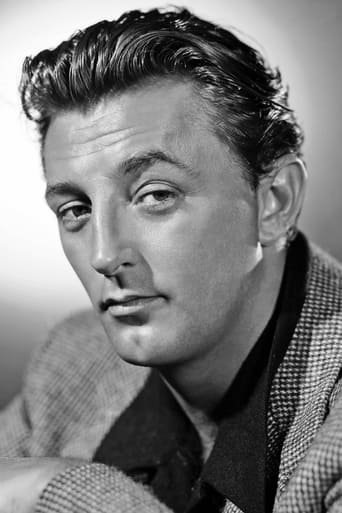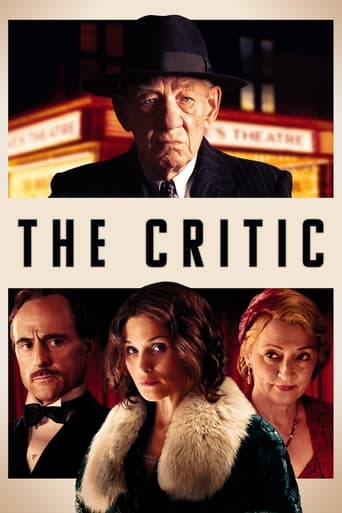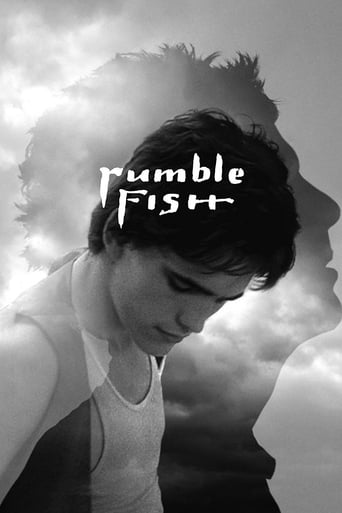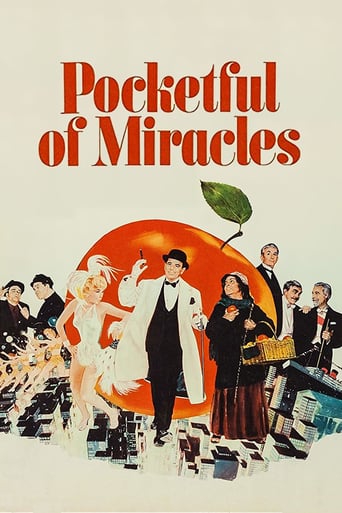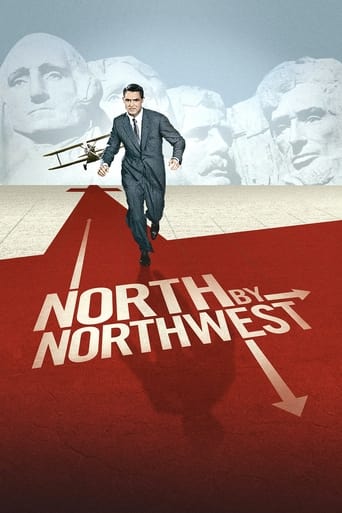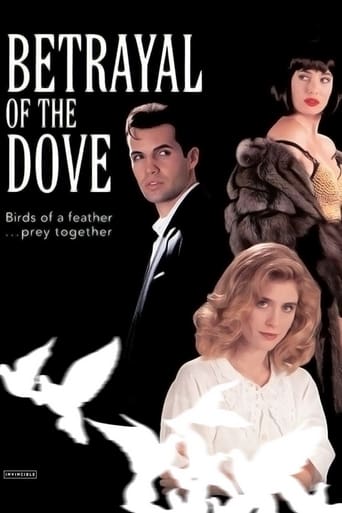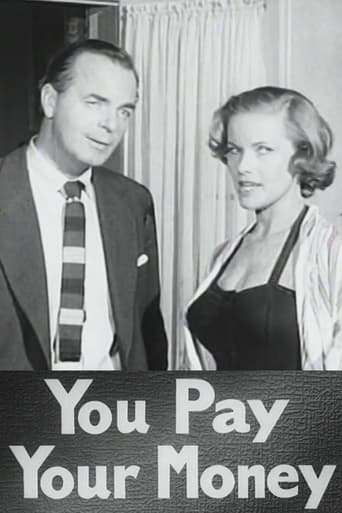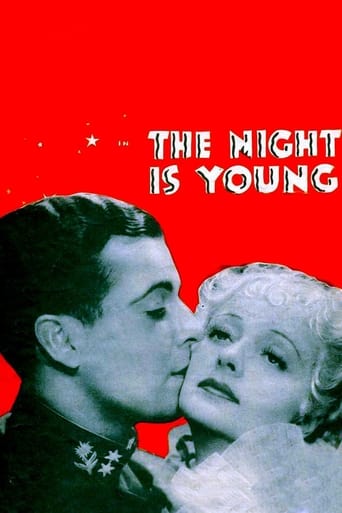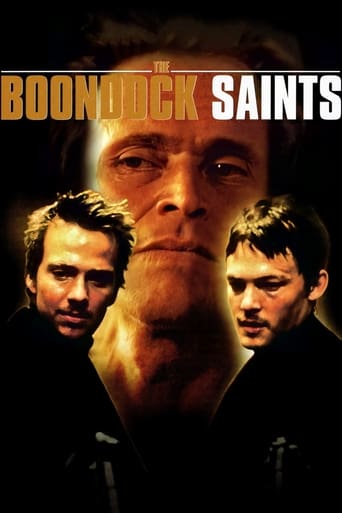Undercurrent (1946)
After a rapid engagement, a dowdy daughter of a chemist weds an industrialist, knowing little of his family or past. He transforms her into an elegant society wife, but becomes enraged whenever she asks about Michael, his mysterious long-lost brother.
Watch Trailer
Free Trial Channels
Cast


Similar titles
Reviews
Surprisingly incoherent and boring
Great visuals, story delivers no surprises
The film was still a fun one that will make you laugh and have you leaving the theater feeling like you just stole something valuable and got away with it.
It’s not bad or unwatchable but despite the amplitude of the spectacle, the end result is underwhelming.
Undercurrent is a prime example of gay director Minnelli's critique of American marriage as a stunting reduction of manhood. (As I recall, Robin Wood established this theme primarily in Minnelli's comedies — e.g., Father of the Bride, Meet Me In St Louis, The Long Long Trailer, etc. — and may or may not have examined it in this melodrama. It's decades since I read his work and my library is, alas, too long gone for me to check. So I may be reseeding Robin's field.) Katherine Hepburn's Ann is a spinsterish independent with no time for the conventional woman's compulsive search for a husband. She's content to work for her professor father in his home chemistry lab. Her father (Edmund Gwenn) is a cuddly, wise, loving man, as handy at the piano as at the test tubes, but he is utterly desexualized by his widowhood and name. She calls him Dinks! Her one suitor is a more paradoxically named prof, the boyish vapid Joseph Bangs (he doesn't). Against that backdrop of male impotence stand the powerful two Garroway brothers. Ann is instantly awed by Alan (Robert Taylor), the slick operator who made his fortune on a long- distance control device he supposedly invented in time to win WW II. But his reputation and character are both false. He killed the German scientist whose device he then stole. In another manipulation to show his power, Alan lets his new wife Ann embarrass herself in a dowdy dress at a reception for his flashy friends. That's to get their admiration for his ensuing remake. Only after marrying Alan does she hear he has a brother Michael (Robert Mitchum). Alan describes Michael as the family black sheep who robbed him to fund his wastrel life, then disappeared. The more he avoids discussing him the more Ann becomes intrigued by him. The two brothers recall the two additives Dinks dropped into the test tube to demonstrate the irreversible effects of love on a placid element. The tube (Ann) bubbleth over.Of course Taylor and Mitchum were box office and romance studs. Taylor was the pretty boy, Mitchum the seething danger. Their personae work here. This time it's the pretty boy who proves the murderous threat, the ostensible Bad Boy the hero.Ann becomes intrigued by what she hears about the mysteriously disappeared Michael. When she collects his rebound book of poems she finds a kindred spirit she initially thinks is her Alan — which ignites his anger and fear. When she visits Michael's ranch (now Alan's), she finds Michael's "home" profoundly more comforting than Alan's. To mislead her, Alan claims his mother, not Michael, played the Brahms she loves — and he hates. That music becomes the signature of Michael's return and their union. Both brothers are "undercurrents," Michael in his sensitive, creative and principled character, Alan by his willingness to kill. The film's major "undercurrent" is the irony that Ann married a fake but thereby finds her true love. She finds it by going beyond the structure — and strictures — of her marriage. The sensitive idealist and firmly individualistic man has no space in this film's institution of marriage. As the parties reveal, this world is gaudily artificial and ritualized, a glib dance of power. Michael spurned Sylvia's love because he met her through Alan and couldn't undermine him. So, too, he later suppresses his attraction to Ann. Michael disappeared because he couldn't bear the burden of bis brother's guilt — nor to betray him. He hoped the war would end his dilemma but he survived. Meeting Ann rouses him to confront him to save her. As nature overrules man's fragile and arbitrary social constructions, the wild horse stops Alan's attack on Ann and the truly civilized outsider Michael fulfills her.
I actually watched this movie 2 times, trying to make myself like it as well as understand it. Hepburn in love with a ghost (or unattainable)person? Taylor being upset because of this threat to him (Hepburn's love for him)? Much ado about nothing. Not believable. It seemed to me that there was a huge attempt at making this appear like a movie of great mystery, intrigue and suspense. And it just fell short. It never seemed to kick in/get itself going. I stuck with it to see if it was ever going to "get itself going", but unfortunately for me, it did not. I thought Jayne Meadows was brilliant in this. Wise gal, hardened and savvy. Too bad she didn't make more movies during her career. although I'm glad she found happiness with entertainer husband Steve Allen.
It's always interesting to see good and favorite players put together in atypical roles and venue. That's part of the draw of this picture. There are obvious comparisons to other films already made in other posts. On to other things. The film has a draw all the way through, as far as I am concerned, because of the players who are interesting enough on their own and the combination of them.Did feel frustrated by a plot element, which comes up here and there in other films - an improbable that's very difficult to ignore or swallow. In this case, it is that a fairly mature and stable girl like Ann would marry a virtual stranger after only a few weeks' acquaintance, and that her father would be gung-ho about it all. It is a bit of a stretch. The father only knew Alan by professional reputation and nothing at all about him as a person. Ann and her father are very traditional people with a settled, thoughtful, slower paced lifestyle. They are solid stock, people who live with deliberation and preparation. For such a girl, regardless of her boredom with a seemingly limited field, to rush into alliance with someone she knows very little about, is unrealistic and frustrating. This only grows as the folly of having done so is played out. She's not a naive ingénue who "falls madly in love" and rashly runs off on such slim acquaintance. But, that's the movies sometimes.Some are concerned that Robert Mitchum "has little to do," that catch phrase used when someone has a smaller part than one would prefer or think appropriate. It helps to know where Mitchum was in his career in 1946, the year this film was released. This picture, along with others done this same year, represent his breakout from routine B pictures with small, obscure roles and billing. He's not the veteran actor in this with many starring roles behind him. As for his playing "against type" in this film, since this is his first major motion picture, he is yet to establish a type. Rather than "having little to do" or being wasted in the role, he is working with top actors for the first time. Again, it's a breakout role into bigger and better things for him.All in all, it's a picture that holds interest as it goes, fulfilling suspense and outcome.
Undercurrent (1946)Melodrama with Katherine Hepburn instead of Bette Davis or Joan Crawford?Yes. And it works, though differently. Hepburn rules the movie, for sure, and she covers some range from sweet daughter of a scientist to a rich man's wife losing her innocence to someone who rises up on her own two feet. She's still the classy (or stiff) Hepburn (depending who you ask). I like her, and I liked her in this film a lot.The plot uses a whole range of clichés but uses them well. The slight twists to what you expect are never shocking, but they keep you guessing. The second big star, seemingly, is Robert Mitchum, but if you are a fan of his, don't see the movie for his role. It's exceedingly minor. A very strange contract arrangement on that one. When he is there, it's undramatic, though he's in command, of course. The other male lead, Robert Taylor, is his usual reasonable, appropriate self--carefully chosen words to avoid saying a little starchy and ordinaire. One bit part is predictably colorful, Marjorie Main with her earthy comebacks.Director Vincente Minnelli is in good form here, actually, and if the movie seems routine, it's the story that holds it back. He has some great photography behind it all (Karl Freund), and the score is unusually effective and beautiful (Herbert Stothart). I wouldn't call it a film noir, though it has shadings of the style and it's from that post war dark period. Instead, it's a noir melodrama. Worth seeing, absolutely, if you like those kinds of films.

